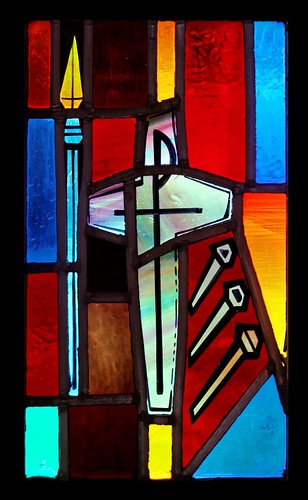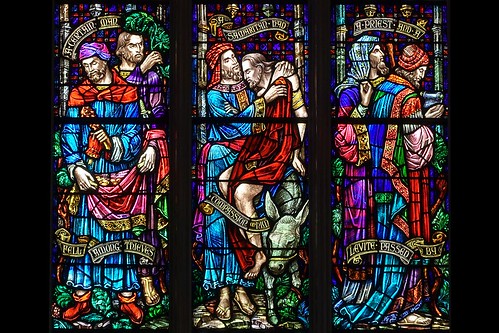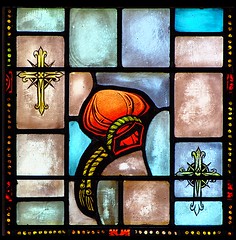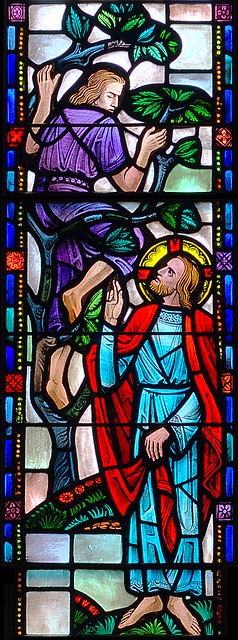 |
| God gives temporal authorities the sword to punish wrongdoers. Joshua was judge of Israel, and instrument of judgment against the idolatrous Canaanites. |
I should first say that I hate guns. I hate violence and the murder and injuries that are caused by guns. I believe that gun violence against people is evil and that the world would be a better place if no one ever used a gun to injure another human being. I am not generally a violent person, and I went into the ministry to save people, not hurt them. I do not own a gun, though I own a couple pocket knives that could possibly be used to save the lives of others, but more on that below.
When I was young and naïve, after the shooting of President Reagan, I was convinced to be in favor of some form of gun control. However, after further study and consideration I have come to reluctantly see the wisdom in the Second Amendment in the Bill of Rights in the U.S. Constitution. This limited “right” properly recognizes that we live in a fallen world, and there are times when violence and tyranny must be met by violence in order to protect the lives and freedom of innocent people. This freedom still makes me a little uncomfortable, but I am no longer in favor of broad gun control.
 |
| The nails and spear were not weapons which Jesus used against others, but He allowed them to be used on Him for our redemption. |
There are some Biblical precedents for arming oneself for self defense and the protection of one’s neighbors. Abraham raised a small army and defeated several kings who kidnapped his nephew, Lot, and stole his property (see Genesis 14). Lot, and the others who were kidnapped with him were rescued and their belongings were restored. Also, in the Book of Esther, the Persian King who ruled over the Jewish captives in exile in Babylon, allowed the Jews to arm and defend themselves from those who sought to kill them. If you recall, the king had foolishly passed a law authorizing the killing of Jews, not realizing that his favorite wife, Esther, was a Jew. Even though the king was prevented by law from changing his foolish law, he issued another decree that the Jews could be well armed and fight to defend themselves against any who sought to destroy them (see Esther 8). This sounds like a recipe for civil war to have two opposing laws calling for violence, but it prevented a greater slaughter. The king also gave great honor to Esther’s uncle, Mordecai, who previously uncovered and foiled a plot against the king.
 |
| Jesus did not defend Himself at His trial, even though He was innocent. He trusted in God to judge Him and vindicate Him. |
Scripture doesn’t have a blanket command for self-defense, lest it be abused as an excuse to commit murder, but we are commanded to help protect our neighbor. As I mentioned above, I sometimes carry a knife, but I am not sure that I would use it to protect myself if I came under a threat. That could possibly seem to be self-serving, and just an excuse for murder, even though easily justified. I would, however, be much more inclined to use a knife or other weapon against someone who was attacking innocent people or those that I love, to protect their lives, if I was in a position to help in that way. Generally, though, I don’t view a knife as a weapon to be used against people. I am more likely to view it as a tool to open envelopes or packages or to cut things around the house or office that need cutting. Unlike a gun, a knife has many innocent uses around the home and the office. The only blood I have shed using knives is my own, when I have carelessly handled a sharp knife in one way or another. I hope never to see another’s blood by my own doing, whether for good or for ill.
I do not know if any of the members of my congregation bring a gun to church. If there are any who do, I would want to be assured that they are well trained and disciplined in its use. I would worry more that a child might accidentally get hold of someone else’s gun and hurt himself or others. However, if a gunman came into our church hell-bent on murder, then I would thank God for anyone who would put a stop to the murderous act. I don’t want any of the members of my congregation to kill anyone, unless they have to, but I would absolve the person who stopped a murderer, as long as it was clear that the murderer was the one who attacked first. Preemptive attacks on people who may or may not be contemplating violence are not justifiable, and are properly punished. Taking the life of someone is something that cannot be reversed, and should only happen if there is no other choice, like when a murderer is intentionally hurting innocent, unarmed people. There are consequences which affect the lives even of trained police officers and soldiers who must take the lives of others in the fulfilling of their duties. I would, without hesitation, comfort and absolve those who had to take someone’s life while protecting innocent lives and preventing more murder and injury.
 |
| Jesus said, “Blessed are the Meek for they shall inherit the earth.” |
Saint Paul writes in Romans 12:18-21 “If it is possible, as far as it depends on you, live at peace with everyone. Do not take revenge, my friends, but leave room for God’s wrath, for it is written: ‘It is mine to avenge; I will repay,’ says the Lord. On the contrary: ‘If your enemy is hungry, feed him; if he is thirsty, give him something to drink. In doing this, you will heap burning coals on his head.’ Do not be overcome by evil, but overcome evil with good.” God is a truly impartial judge, and we are all accountable to Him in the end. If there is going to be punishment, we ought to leave it to God, or to His servants here on earth. God has established the proper authorities to punish wrongdoers, and to keep the peace. If we seek vigilante justice ourselves, we are almost certain to take it too far.
Hebrews 12:14 says, “Make every effort to live in peace with all men and to be holy; without holiness no one will see the Lord.” We cannot make ourselves holy, but if we aspire to be sanctified by God, the Holy Spirit, we ought to strive to be holy in all we do or say. This should be the guiding rule when it comes to self-defense. We should love our neighbor as we love ourselves (Leviticus 19:18). That means we ought to be hesitant to use violence against anyone unless it is absolutely necessary. Murderers are our neighbors, too, and if we can stop them without killing them, then they may be be brought to repentance and be saved. Jesus died to pay for the sin of murder, also. However, there is still temporal punishments for the sin of murder. After the great flood, God said to Noah, “Whoever sheds the blood of man, by man shall his blood be shed; for in the image of God has God made man.” (Genesis 9:6)
For further reading, see my December 2017 article on Anger.






